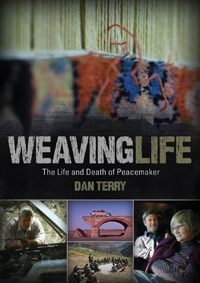In the last month or so, a narrative film, a documentary and a poster on Facebook came across my desk. The films were sent for review, but the Facebook poster (or image) arrived in my newsfeed this morning, unbidden, a “share” from my youngest sister.
“Weaving Life” a documentary on The Life and Death of Peacemaker Dan Terry – is a film from MennoMedia that will air on participating ABC stations beginning Oct. 21 (check local listings). It is the story of Dan Terry, one of 10 humanitarian workers killed on Aug. 5, 2010, as they made their way to Kabul, Afghanistan, from the Nuristan Province in the south. At first the Islamic Party and the Taliban took credit for the attack, but later, some Taliban leaders refuted this and condemned the killings.
Why were Terry and his companions killed? In the documentary, Terry’s friends and colleagues explain the complex reality that is Afghanistan and say the work of the U.S.-led allied forces is aimed at development, schools and medical clinics, but with a political end. Humanitarian aid workers do the same, but to help the people help themselves. Afghans, at times, cannot tell the difference, and humanitarian aid workers become political targets.
Terry lived and worked in Afghanistan for 40 years. He and his wife raised three daughters there during the Russian invasion, Taliban rule and the current U.S.-led war. Terry was a Methodist who lived and often worked with Mennonite humanitarian and medical groups to empower the people of Afghanistan to sustain themselves through farming and education.
One story that stands out in the film for me is that of a 12-year-old girl who stood up at a gathering in her remote village to ask for a school after humanitarian workers asked the people what they needed. The leaders of the village and the workers built two schools, one for boys and one for girls. Then came the years of Taliban rule, and no one knew what had happened. Aid workers visited several years later, and one of the schools was still functioning. The teacher looked familiar — the 12-year-old girl had become the teacher.
Terry grew up in northern India and was greatly influenced by the life and teachings about nonviolence of Gandhi. Dan’s father, George Terry, also influenced the young man; he was a conscientious objector during World War II, something almost unheard of.
Terry emerges from the film as an adventurer, an extraordinary gentleman who taught his daughters to always be gracious to others and that wherever they put their carpets was home. Terry was a Christian but not a missionary, per se. He said he was “giving witness, not by preaching, but by being the face of love.”
Click here to continue reading












